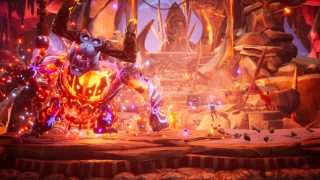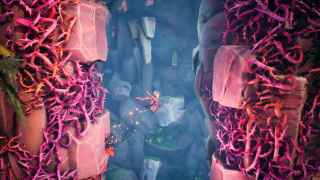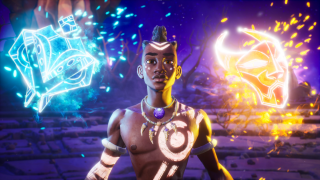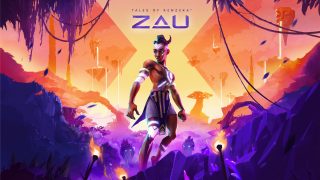Q&A with Tales of Kenzera: Zau’s Creative Director Abubakar Salim
Launching his first video game, jumping from actor to creative director, and channeling his life into art.
May 28, 2024

Abubakar Salim is an artist. An empathetic, intelligent, thoughtful leader and a massively creative force. Attributes that would serve the Founder and Creative DIrector of Surgent Studios (and Hollywood actor–known for roles in Ridley Scott’s Napoleon and HBO’s House of Dragons) very well.
And on April 24, 2024, after years of development, planning, and careful preparation, Abu launched his first-ever video game: the EA Originals Tales of Kenzera: Zau, now available on PlayStation 5, PC, Nintendo Switch, and Xbox Series X/S.
We had a chance to sit down and talk to Abu about the deeply personal and uniquely creative journey of launching his first video game, how he balanced being an actor while leading Surgent Studios, and how he channeled his journey of grief into a beautiful piece of art.
Thank you for joining us today, Abu! Here we are shortly after the launch of your first-ever video game, Tales of Kenzera: Zau. How are you feeling?
I’m tired. I’m tired. [Laughs]. Honestly, I'm very excited. It's a weird one. It's a really weird one because it feels like I’ve held onto this child for so long, or this thing for so long, and then I’m giving it to the world, you know, to do its own thing. You have no control over it anymore. As soon as it's out there, it's out there. Then, people decide what they think of it. So it is this weird feeling of elation, but also excitement, and just fear because… it was so personal to me for a very long time. But now it's out there in the world, and it's like, okay. Here we are.
“You're giving a part of your mind to someone, your thoughts and your dreams. You're giving that to people.”
Let’s explore that personal connection. You have long been an actor in video games, movies, and TV shows. But this is your first time creating your own story, and your own game. What was that like?
Yeah, I think a lot of the time, as an actor, what you end up doing is you come in when the process is sort of done. So you come in, you do your thing, and then you move on. You still respect the art and the storytelling, but the difference between this and crafting a piece of work from zero to nothing is that you're giving a part of yourself to someone. You're giving a part of your mind to someone, your thoughts and your dreams, in a way. You're giving that to people.

How about juggling your roles? You never stopped acting while you were making Zau. What was that like?
I think what's been really good about maintaining acting while also running a studio has been they both help one another. They balance and play with one another. You know you've got one outlet where you are being told what to do. And then you've got another job where you're technically running the ship.
So you've got these two different perspectives as you go along with this whole thing. So they do kind of aid and feed one another in the sense that they lead you to create in different ways.
But for both, there was a sense of allowing creativity to flow, even with the shows and the films that I did beforehand. I'd be obsessed with learning the lines backwards and forwards. And I didn't realize that actually, what ends up happening is you end up imagining how you're gonna say those lines, and you can't break that. But if you just learn your lines and hope on the day you remember your lines, and you just listen to the other person, you have a lot more fun. And actually, it feels a lot more spontaneous and a lot more fluid. It's so much more electric and exciting.
So what I took from that was when I came into the studio. Rather than me coming in and saying like, ‘Oh, these are all the answers.’ Instead, I have some answers and some ideas, but I want to hear from my colleagues and chase these creative moments together.
“I want to hear from my colleagues and chase these creative moments together.”
That's so interesting. It sounds like you allowed yourself to jump in and flow with the river rather than try and build a dam.
Yeah, because I think a dam is trying to control the situation, whereas actually flowing with the river, you are literally going with it. And I think that's the way to go. That's how any creative process that has worked for me has gone. And you know, I'm a big believer as well that people can sniff or feel when something doesn't click or feel right. Society tells us to always be in control, when actually, you realize that you have a lot more freedom and paradoxically, a lot more control when you accept that you are not in control. [Laughs].
“What better way of experiencing the story than actually being in it?”

Love it. Now, I wanted to ask about choosing video games to tell this story. Why use this medium instead of, say, film, TV, or books?
For me, it’s truly because you're asking the audience to actively go on a journey with you. There's something to be said about giving an audience member the pad or the controller and being like, ‘Hey. You have to actively move this story forward.’
There's something really powerful about that. For us, as well, this is a journey of grief. And it had to be inspired by the Metroidvania genre. Because, for me, that's what encapsulates grief. Throwing a person into an alien world and then having to be comfortable with it. And that's what you put the audience through every time they pick up this pad and go through this world–they are thrown into it. They have no idea where they're going or what's going to happen.
What better way of experiencing the story than actually being in it? It goes beyond what film and TV can actually do in the sense that you have to partake in this world because there's no other way of progressing this story or this journey without you hitting left or right.

Speaking of the story. Zau has a meta storytelling aspect to it, where the character of Zuberi is reading the story of Zau, which we are then playing. What inspired this choice?
For me, it was really important to capture and show this idea that grief is timeless. You could literally be in the world where the God of Death exists, and you will still be grieving the loss of someone you love in the same way that if you were in the modern day. Grief is timeless.
“I've always believed that the most compelling characters are the ones that feel the most human. And by this, I mean they have their flaws.”
Tell me about making the character of Zau, because he’s fascinating. He is a young shaman, a spiritual leader to his people, yet in a state of grief, having just lost his father. He’s also quite hot-headed and is often acting rash or hasty, much to his dismay.
It was just pulling from truths. I've always believed that the most compelling characters are the ones that feel the most human. And by this, I mean they have flaws. They're not going to get along with everyone.
I pulled a lot from where I came from after I lost my father. The sense that I kind of switched off and was like, ‘All right, cool. Just keep going’, you know? And that shut me off from a lot of people and from a lot, you know, even from myself, emotionally. And I think if I went in with Zau being upset and sad but wanting to do good for other people, it just wouldn't be honest. That's really, truly where it comes from.
You know, grief is an isolating thing. It's almost weirdly selfish. And it's something that I wanted to highlight here in the sense of this is what he's going through. I just felt like if I wanted to depict Zau properly; he has to be a young man going through this.
“…a lot of this really couldn't have come about if it wasn't for the EA Originals program.”

At EA, we are a company of creators, innovators and storytellers. We are dedicated to making deeply immersive experiences for millions of players and fans around the world. And we couldn’t be prouder to support Abubakar and Surgent Studios in the creation and launch of Tales of Kenzera: Zau. Abu's creative journey mirrors the trajectory of EA itself—a perpetual quest for innovation and excellence. We are proud to support this gift he has created in honor of his father and look forward to continuing on this road together toward bigger, bolder, and better interactive entertainment experiences for all of our players.
Want to get involved? Join EA as we continue to innovate and make online play safe, inclusive, and suitable for everyone. You can also learn more about the making of the music of Tales of Kenzera: Zau with Emmy award-winning and internationally-renowned composer Nainita Desai.

